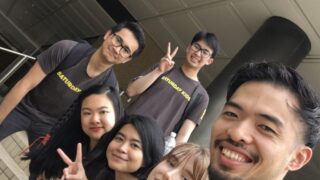The Greek philosopher Heraclitus said it best: “The only constant in life is change.”
Nadia Thu Huong Ho lives by this sentiment. A Czech and Vietnamese citizen with permanent residency in the US, her experience is cross-cultural, to say the least. She has traveled to forty countries, lived in seven, published books in three, and cofounded three projects that serve teams across six continents. She identifies her role as “an international program manager for multiple cross-cultural projects focusing on education and youth training.”
In other words, she is a generalist who utilizes an eclectic assortment of skills—language, leadership, and conflict resolution, to name a few—in her role.
However, Ho has observed that many companies cling to the tradition of seeking specialists, not generalists, for many roles. “When asked, ‘What do you do?’” Ho says, “You are expected to provide a simple response—engineer, teacher, entrepreneur.”
But the world is changing. Progressive businesses, like global design firm IDEO, have come to value “T-shaped people,” who have specialized knowledge in one area, but wider understanding and appreciation of other disciplines. Even beyond progressive businesses, staunch traditionalists like the US military have started preferring generalists over specialists. Generalists are now getting recognized as one of the most valuable assets a growing business can have.
Ho firmly believes this is a positive trend for the future of work.
Young people entering the job market now are perfectly positioned to take hold of their changing environment and grow as generalists. For them, Ho is eager to share her three secrets to becoming a superb generalist: lead like a facilitator, study languages, and find a role model.

Nadia Thu Huong Ho
Next Article
The Great Unplanned Career (Yes, It’s Doable)
1: Be a facilitator.
“Being a good manager or leader is about being a facilitator,” says Ho.
A facilitator is a person who empowers others to see the big picture of their everyday tasks. Generalists have a wide breadth of knowledge, but that doesn’t mean they don’t also have specific skills. Ho seeks to leverage these early.
“In the initial interview, I ask my potential team members about their strengths, weaknesses, and life goals,” she says. “Then I assign them roles that not only suit their strengths, but nourish their weaknesses and help them get closer to their goals.” Her team members are then trusted and given responsibility from day one. It’s not just about current skills—it’s about a growth mindset, learning from mistakes.
Under the pandemic, facilitation has become a crucial skill to effectively run a business, and this will continue into the future. Ho facilitates by leveraging her generalist knowledge to help her team members explore their strengths and weaknesses. Anyone hoping to succeed as a generalist and leader (or a leader of generalists) should make a point to do the same.
Next Article
After Searching the Globe, Star Educator Finds Purpose at Home
2: Study languages.
Let’s be realistic: English is an essential skill for business. If you can speak English, you can communicate with 1.35 billion people out of around 7.9 billion around the globe. But that doesn’t mean learning other languages is useless. In fact, languages can be some of the most valuable tools in a generalist’s toolbox.
Ho speaks five languages (Vietnamese, Czech, English, French, and Spanish), and this has been invaluable for implementing multicultural projects. Is it impossible to work with teams that don’t all speak the same language? No, but putting forth the effort to cross that language barrier unlocks a whole new audience and gains a lot more trust.
“I really enjoy building communities with people from different backgrounds, coming together through shared values, and working toward shared goals,” says Ho. “Speaking different languages helps me see the world from different perspectives.”
This was something she was lucky enough to learn early, when she immigrated to the Czech Republic at the age of nine and started school less than one month after her arrival. It quickly became clear that utilizing language was a way to bring together people from diverse backgrounds.
Now, as a facilitator, combining languages with her other skills as a generalist has enabled her to break down barriers and go farther.
“Even when two people come from the same country and speak the same language,” she says, “the true meaning of their words might differ.” Being multilingual, Ho finds it easier to imagine multiple ways to interpret word choice, and this helps her teams overcome—sometimes altogether avoid—conflict and misunderstanding.
It’s true that languages have value for generalists and specialists alike. However, it’s generalists who can use language not only as a vehicle to convey ideas, but as a lattice between various skills.
3: Find a role model.
Although it might sound like Ho was thrown into the deep end of a new culture and survived on her wits alone, this was not the case—nor should it be for any leader. For women, in particular, some studies have found a correlation between role models and leadership goals.
“Observing and learning from people you look up to is a great way to generate motivation to achieve your goals and overcome your fears,” says Ho. Generalists like her need general role models who can provide more than specialist knowledge. In her case, these people are her grandmother, a Romanian friend, and her husband.
Her grandmother has survived three wars that destroyed her home multiple times. And yet, she holds no grudge against the foreign soldiers. “They were just victims like me or anybody else,” Ho recalls her saying. “They only did their duty to serve their countries.” This attitude inspired a young Ho to grow up generous and kind.
Later, as she began her professional journey, she met a young Romanian woman who, upon hearing Ho’s story and ambitions, began connecting her to opportunities and contacts. The two became fast friends, and it didn’t take long for Ho to realize how life changing a simple introduction could be. The relationship inspired her to become a global citizen and changemaker
For the past eight years, Ho’s role model has been her husband. “Growing up,” she says, “I was taught to always think about what other people might think and say. But now I realize the more you try to please everyone, the more miserable you become.” Her husband, with what she refers to as a “genuine, unfiltered” way of living, has become her guiding star to realize her potential.
Ho insists that everyone should seek out at least one role model. The people you admire are a vital resource if you want to stay motivated and achieve your goals.
Generalists of Today and Tomorrow
The pace of change in this age of digitization, pandemics, and social revolution can be dizzying. There is no way to predict what the job market will look like in five, ten, or twenty years. But there is hope for those seeking to learn from and experience life to the fullest. Communication, creativity, critical thinking, and other soft skills will be invaluable for generalists and specialists alike, no matter where the future takes us.
“Get out of your comfort zone,” says Ho. “Try out different types of work in different fields. Acquire diversified skills—that will open your lives to a world of vast possibilities.”
The traditional career path is crumbling fast. Starting with a low-end job may no longer mean you get stuck in one forever, especially if you approach it with a learning mindset. As a generalist, you can learn from what goes well and what doesn’t. The things you learn will become assets for your future, and for the future of those you lead.




